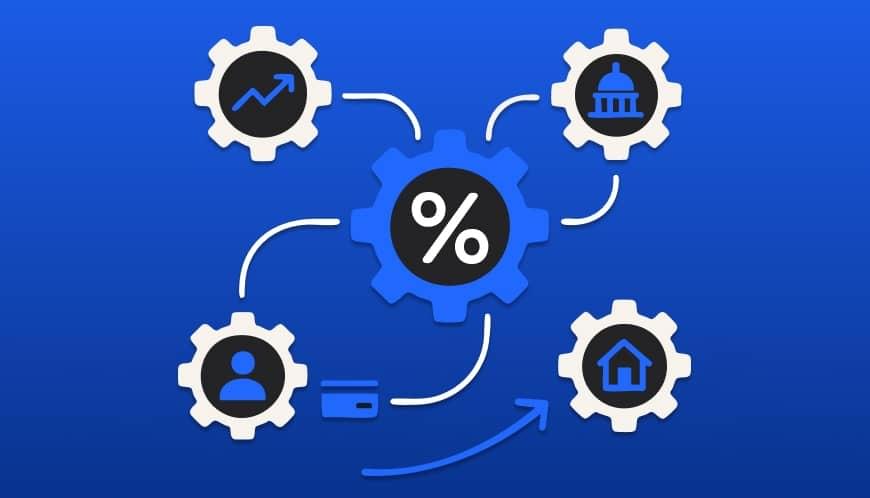How mortgage rates are set

Mortgage rates are a major consideration when you apply for a home loan. Higher rates will mean more money paid over time, while lower rates can be looked at as more savings in comparison.
Understanding how mortgage rates are set and what goes into them can help you decide on the right time to get or refinance a mortgage. The key components in changing mortgage rates are the Federal Reserve, mortgage bonds, inflation, the economy, the housing market, your personal finances and industry competition.
Mortgage rates rarely hold for long. If now is the right time for you, don’t wait till mortgage rates change, apply now!
Federal Reserve
While the Federal Reserve doesn’t set mortgage rates, its policies affect the rates lenders can offer.
The Federal Reserve meets eight times a year to set policies to ensure economic stability. One way it does this is by setting the federal funds rate, which is the target interest rate banks and other institutions can borrow and lend at.
The federal funds rate has a direct correlation with mortgage rates, so if you see the federal funds rate rising, you can expect mortgage rates to rise along with it.
Mortgage bonds
Bundled mortgages, usually 15- or 30-year mortgages, that lenders put together and sell to government agencies like Freddie Mac and Fannie Mae, are sold again to investors as mortgage bonds. Lenders do this as a way to ensure they have the funds to issue new loans.
As these mortgage bonds are invested in, their prices rise and mortgage rates tend to fall. Mortgage bonds make investors profits through appreciation or when borrowers make regular monthly payments.
Inflation
As inflation rises and the purchasing power of the dollar falls, lenders tend to increase mortgage rates to make up for the fact that the money they are getting back isn’t worth as much as before.
The economy
Buying a home is one of the biggest purchases someone will ever make. If the economy isn’t strong, potential homebuyers tend to be hesitant about purchasing a home, let alone taking out a loan for that purchase.
To help encourage potential homebuyers, mortgage rates usually see a dip with the economy. Of course, the reverse is also true. If the economy is strong, mortgage rates could remain higher.
Housing market
Contrary to popular belief, the housing market affects mortgage rates more than mortgage rates affect the economy. If houses aren’t selling in an area, that means there aren’t borrowers looking for mortgages. So, just like when borrowers aren’t looking for mortgages during dips in the economy, mortgage rates are lowered to entice potential homebuyers into loans.
Personal finances
When it comes to your personal finances, the lower risk you are as a borrower, the better rate you could receive. Your credit score, down payment amount and length of your mortgage can all show that you are a lower-risk borrower.
Your credit score lets a lender know how well you pay any debt or loans you may have. A higher score, which reaches a maximum of 850, means that lenders will see you as a lower risk. Building up your credit score before applying for a mortgage could get you a more competitive rate.
With a larger down payment, you will need less of a loan when buying your home. A smaller mortgage due to a large down payment means the more of your own money you will have invested in your home and the less lenders risk on loaning you the remaining money.
With a longer mortgage, lenders worry that there is more time for something to go wrong and for borrowers to default on their monthly mortgage payments. This is why you may see better rates on a 15-year fixed-rate mortgage than for a 30-year fixed-rate mortgage.
Industry competition
With everything else considered, there will be mostly small differences in rates among lenders. Lenders might be willing to compete when it comes to your rate in hopes of increasing their loan volume.
To find out if any lenders will offer you a more affordable rate, you can compare a few lenders to one another. However, if you wait too long before deciding on one, some factors could change, and your rate might be different.
How to get the best rate
Unfortunately, there is no one trick for getting the most affordable rate. Since few people can predict where the market is heading, potential buyers who wait for rates to drop often end up with mortgage rates higher than their desired amount.
As it is difficult to predict where the market will go, one option for ending up with a lower rate is to get a fixed-rate mortgage and refinance it when rates drop. There are several refinancing options depending on your needs and the nature of the original loan. And if rates only rise after you have your mortgage, you don’t need to refinance or worry about being stuck with a higher rate.
To refinance your mortgage or get one at the current rate, apply now!
Applicant subject to credit and underwriting approval. Not all applicants will be approved for financing. Receipt of application does not represent an approval for financing or interest rate guarantee. Refinancing your mortgage may increase costs over the term of your loan. Restrictions may apply.
